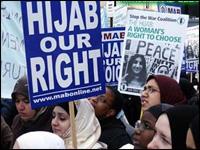Transcript
BOB GARFIELD:
From WNYC in New York, this is NPR's On the Media. I'm Bob Garfield.
BROOKE GLADSTONE:
And I'm Brooke Gladstone. This week, the Attorney General scandal competed for airtime with captive sailors, a British crew that may or may not have trespassed in Iranian waters. Among them, leading seaman Faye Turney, featured on Iranian TV in a head scarf, praising her captors.
FAYE TURNEY:
Obviously we trespassed into their waters. They were very friendly, very hospitable.
BROOKE GLADSTONE:
On Thursday, we spoke to Matt Wells, media critic for The Guardian newspaper. He says anti-Muslim sentiment has been inflamed since the terrorist attacks in London two years ago, so the symbolism of a British sailor mum paraded before the world in a hijab sent the tabloid press into an ecstasy of rage, starting with The Daily Mail.
MATT WELLS:
It's quite clear what they're trying to do. There's a picture of the female service personnel next to a long banner headline which says, “A British mother paraded on state TV, Forced to wear the hijab, Made to praise her Iranian kidnappers. And the response from our mighty foreign office? This is unacceptable, they squeaked.” [BROOKE LAUGHS]
So, I mean, that's quite a clever way of bringing together all sorts of different issues in the one headline. Today's Daily Express, which is fighting for the same kind of middle-market readership as The Daily Mail, has the same picture, and its headline is "Forced to Wear a Muslim Scarf: How Iran Paraded a British hostage." So, again, they're highlighting the Muslim scarf issue.
The other paper is The Daily Mirror. "Outrage" is its big headline. Again, the same picture: "A young mum paraded like a trophy on TV, forced by the cowards of Iran to lie about how she and 14 British servicemen were taken hostage." So, similar imagery there…
BROOKE GLADSTONE:
Would you say that the tabloids are expressing the kind of collective zeitgeist, and is the anger being evenly split between Iran and Tony Blair?
MATT WELLS:
Yeah, I think there is a fairly even split of anger, because there are plenty of villains in this piece. And, you know, the British tabloid press is very clever. It knows its market very well. It knows what the fears and prejudices and concerns of its readership are. That's why these papers sell millions of copies every day.
And it has to be said that, you know, most of Britain, most of white middle-class Britain is worried about these kinds of multicultural issues since the July 7th bombings. You know, it's concerned about the attitude of Muslims toward them. And when they see women clad from head to toe in black burkas, it's frightening.
And so these kinds of headlines play on these fears that people have. You know, whether these fears are genuine or not, the fact is that this is what people feel, and the press is quite clever to play on those fears – for quite nakedly commercial gain – in order to sell more newspapers.
BROOKE GLADSTONE:
But what about the more left-leaning press? How about your newspaper, The Guardian, or The Independent?
MATT WELLS:
The Guardian and The Independent and The Times - they're kind of the more serious end of the market – the heavies, as we like to call them – are [LAUGHS] giving it a bit more balance. In these papers, there is more nuanced coverage, but I have to say [LAUGHS] there's not much nuance in the bottom end of the market.
BROOKE GLADSTONE:
But do they have the story essentially right or are there some wrong facts that seem to recur in the tabloid press, the bottom end?
MATT WELLS:
Well, yeah. It's certainly the case that facts don't get in the way of a good story. Take the headline in The Daily Mail that said that Faye Turney was paraded on state TV. Well, it's not the case. Actually, her pictures were shown on a rather obscure satellite channel that is linked to the Revolutionary Guards, and which broadcasts in Arabic. And most people in Iran don't speak Arabic. They speak Farsi. That channel is watched, I understand, more in Iraq than Iran. And our correspondent in Tehran has been saying that this story really isn't getting much coverage within Iran at all, and most Iranian people are not aware of it.
BROOKE GLADSTONE:
Matt, thank you very much.
MATT WELLS:
You're welcome.
BROOKE GLADSTONE:
Matt Wells is the media editor for The Guardian.

